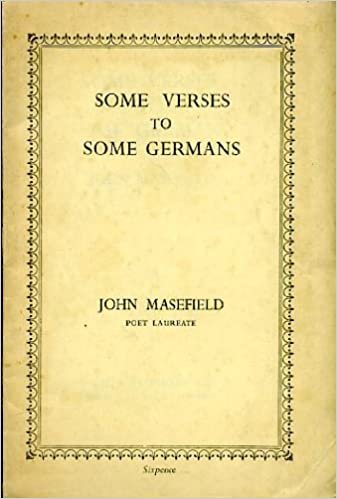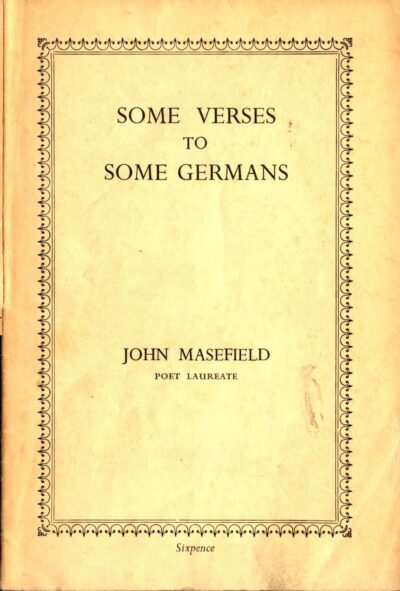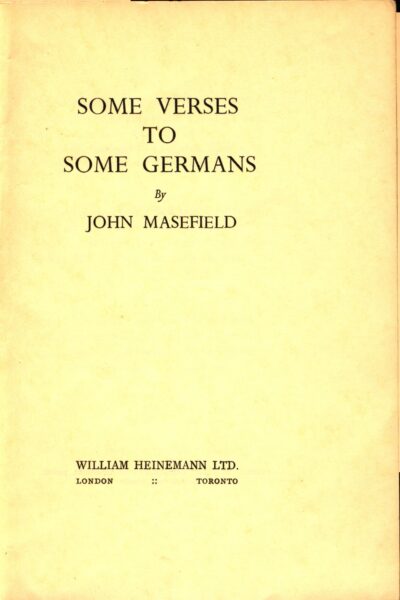John Masefield, Some Verses to Some Germans (1939)
John Edward Masefield OM was an English poet and writer, who held the prestigious title of poet laureate from 1930 until his death in 1967. Born as the son of a solicitor in 1878, Masefield had a troubled upbringing that saw his mother die giving birth to a sibling and his father suffer a mental breakdown. After attending school, Masefield took up a career as a sailor in an attempt to cure what his aunt thought was an addiction to reading. The travels involved had the opposite effect, opening up an artistic passion that eventually saw Masefield jump ship in New York in the hope of becoming a writer.
After spending some time living as a vagrant and working in a carpet factory, Masefield returned to England and began to garner some notoriety as a poet. He began to be published in periodicals and his own collections of works, and by 1912 he won the Edmond de Polignac Prize. When the First World War broke out, Masefield joined the staff of a British hospital for French soldiers. After his term expired, he spent much of the rest of the war in America trying to convince his hosts of the merits of the Allies’ cause.
Masefield’s reputation grew with wartime publications entitled Gallipoli and the Old Front Line, and during the 1920s he established himself as one of Britain’s leading poets. In 1930 Prime Minister Ramsay Macdonald recommended to the King that Masefield be appointed Poet Laureate, an honorary position dating back to the seventeenth century and whose previous holders had included such prestigious figures as William Wordsworth and Alfred Lord Tennison.
The post comes with the expectation that the laureate will write verse for significant national occasions, and so it was that Masefield tried to come to grips with the outbreak of the Second World War in Some Verses to Some Germans. The poem tries to articulate the feelings of a generation that had endured the horrors of the Great War and who were now bracing themselves for the consequences of the sequel which they had desperately sought to avoid.
Menzies’s copy is poignant because we know the great emotional weight he felt bringing his country into a new global conflict as Prime Minister in September 1939. He is sometimes accused of having been an ‘appeaser’ in the face of a rising Nazi threat, but so was his predecessor as Prime Minister and so was the Opposition Leader; appeasement was the mood of the nation. Few could fathom the human cost that it would ultimately take to secure the future of liberal democracy.
The poem reads:
Within the glory of that light, the Soul Perceives un-numbered Life, in each distinct, Each Precious as a jewel to the Whole, And each, in Light, to other, ever linked,
And how each mite of that abounding June Beats with the pulse of an eternal heart, Being towards its Sun a mortal Moon A shadow to a shining counterpart,
And, seeing, can proclaim that we are one With the sublime of force that rolls the sky, System and starry system, sun and sun, And being brothered to it cannot die.
Since Man has been, the vision has been his That Wisdom cradles his autumnal scheme, That, though his red leaves fall, the Wisdom is beyond all seer’s sight or poet’s dream.
Into that Wisdom, energetic Mind Thrusts, and the thinking Soul, excluding sense, Woos it, until its beauty makes him blind, And he, being naught, is merged in its Immense.
There is no Death, for all is beauty there, There is no darkness, it is wholly light; Joy is its life, for utter Truth laid bare, Praise is its service and is infinite.
You, like ourselves, now enemies, have sought An entrance to that radiant atmosphere, To quench our darkness in the fire of thought And bring the light to lighten mortals here;
You, with a Music so divinely great That all who hear forget Man’s living foes, The Pride, in wicked league with Craft and Hate, Lying and Lust, and Murder linked with those.
We, with a Poetry so mixed in kind That all who read forget Life’s counter-parts, The Sloth, that is a death upon the mind, The Nescience and the Greed that murder arts.
In that Humanity which makes us brother, In Art’s annihilation of the night, Our lights have shone upon and blessed each other Our very souls have given each other light.
This is no idle boast or empty story; One of the glories of the English race Is, that we recognised Beethoven’s glory, And at his dying moment won his grace;
For, in Vienna, while the thunder broke, And he, by sickness shaken, sank to death, These memorable words that Master spoke, “God bless the English” with his dying breath.
And, of our Poet, we have heard you say “We call him ‘Unser Shakespeare’; he is ours; We share him with you as we share the day, The night, the seasons and the happy hours.”
O rightly your sublime one as he died Called for more Light; for Death is of the dark, And darkness dwells upon Man crucified, Light, on the dove returning to the Ark.
Light is above all darkness and dispels All darkness soon, but not till it has laid The gloom of all the horror of its hells Upon the quiet homes that Love has made.
I write among the grasses wet with dew; The river runs in the mist, the field’s a-cold The reeds have withered that the moor-chick knew, but, still one deathless butter-cup is gold.
One flower, that within her yellow cup Catches an inch of light more truly worth Than all the gathering Dark devouring up The past the present and the hope of Earth.
Amid the darkness, sad with women’s woe, In the thief’s time an hour before the Sun, When upon foot-pad feet the foxes go, From roost to roost, I heard the cock-crow run,
And knew that under Earth’s revolving rim, A morning, unlike any yet, had stirred; The Sun was living; the bright thought of Him Had startled exultation in the bird.
We are as darkness to each other now, Our common task of bettering Life annulled; We plait new brambles on our Saviour’s brow; By sharpening hate our Spirits’ edge is dulled.
Upon another morrow, if we strive, Our links of Life, now broken, may unite, Not each for each but both for all alive Opening the other shutters for more light.
You might also like...
Sign up to our newsletter
Sign up for our monthly newsletter to hear the latest news and receive information about upcoming events.




